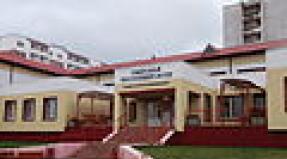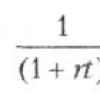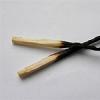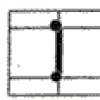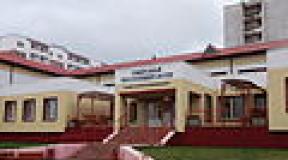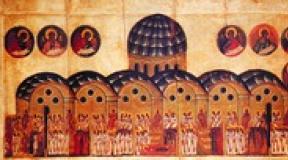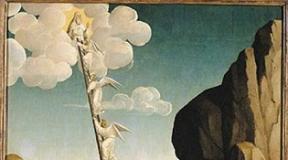Provisional government. Provisional government in Russia What did the Bolsheviks do with the provisional government
Activities of the Provisional Government (February-June 1917).
After the abdications of Nicholas 2 and Mikhail (Alexandrovich?), the only legitimate body of central government was the Provisional Government, which replaced the Duma Committee on March 2. A peculiar political situation developed in Russia. At the same time, there were two authorities - the Provisional Government and the Council of Workers' and Soldiers' Deputies. This situation is called dual power. The creation of the Provisional Government was the compromise to which the Provisional Committee and the Petrograd Soviet were forced to resort. The first personified the moderate forces of society, which alone by this time were a more or less organized force. The second represented a real, but completely unorganized force of the crowd and therefore could dictate terms to the Committee, but was unable to organize government.
Having emerged, the Provisional Government declared its commitment to the principles of democracy, abolished the system of estates, national restrictions, and carried out a number of other measures, which, of course, earned the respect and gratitude of its fellow citizens. However, the final resolution of these and other issues was postponed until the convening of the Constituent Assembly. The people were asked to bring the war to a victorious end. The first crisis of the government arose in April in connection with a note from the Minister of Foreign Affairs P.N. Milyukova. In it, he wrote that “while continuing to have full confidence in the victorious end of this war in full agreement with the allies, the Provisional Government is absolutely confident that the issues raised by this war will be resolved in the spirit of creating a solid foundation for lasting peace.” The crisis was overcome by the formation of a new government in May 1917. It included socialist ministers (A.F. Kerensky, M.I. Skoblev, G.I. Tsereteli, A.V. Peshekhonov, V.I. Chernov, P.N. Pereverzev) as representatives of the Soviets.
It was assumed that this tactical move would strengthen the government’s position and increase the authority of the Soviets by strengthening control over government activities. The idea found its further development in the decisions of the First Congress of Soviets (June 1917). The congress formed the All-Russian Central Executive Committee and authorized the long-prepared offensive at the front. On the issue of power, the need for a coalition was confirmed. The congress delegates saw overcoming the crisis in the economy by strengthening the centralization of management of the national economy and by “moderate” taxation of entrepreneurs.
Overthrow of the Provisional Government. The Bolsheviks came to power.
The failure of the summer offensive at the front caused a new political crisis. Demonstrations took place in the capital demanding the transfer of full power to the Soviets and the resignation of the government. The speeches caused confusion among moderate socialists. Radical left factions began to form in the organizations of the Mensheviks and Socialist Revolutionaries. The situation was complicated by the worsening economic situation. On July 2, Minister of Food A.V. Peshekhonov informed about the food crisis engulfing the capital and its environs. The Fuel Committee reported the impending shutdown of factories due to lack of fuel. Similar things were observed in other industrial centers.
The way out of the crisis was seen along the path of a tougher course towards the revolutionary movement. On July 3, the Cadet Party announced the recall of its ministers from the government. The artificially created government crisis was intended to push moderate socialists to more decisive action. The idea found support and understanding. On the same day, the Organizing Committee of the Menshevik Party decided to form a new government “if possible with a predominance of representatives of the bourgeoisie.” The proposal was supported by the Central Committee of the Socialist Revolutionary Party and the Central Executive Committee of the Soviets. The subsequent measures taken to stabilize the situation - the suppression of demonstrations by force of arms, the closure of the left-wing press, the introduction of the death penalty at the front, the postponement of elections to the Constituent Assembly - characterize the chosen course, but its implementation also had negative consequences. From the sphere of political dialogue between various political forces, the struggle increasingly moved into the sphere of violence and bitterness, polarizing Russian society. The Bolshevik Party at its VI Congress (August 1917) decided on an armed uprising, the ultimate goal of which was to overthrow the government and gain political power.
At the end of August 1917, right-wing forces attempted to carry out a coup d'etat and establish a military dictatorship in the country. L.G. was elected as dictator. Kornilov. He formed 33 shock battalions and sent them to pacify the capital. The conspiracy was defeated. The behavior of the Cadets on the eve of and during the crisis led to a sharp decline in the authority of the party among the people. Due to internal disagreements about the form and structure of the new government, and ways to get the country out of the crisis, the split among the socialists, in the Socialist Revolutionary and Menshevik parties, is deepening.
The unsuccessful military coup of General L. Kornilov stopped the process of stabilization of the situation in the country and the army, achieved by the Provisional Government in the summer of 1917. The Soviets, increasingly controlled by the Bolsheviks, emerged from the crisis with increased popularity among the people. If in the Petrograd Soviet on March 2, 19 votes against 400 were cast for the Bolshevik resolution against the transfer of power into the hands of the Provisional Government, then on August 31, the absolute majority of the Council supported the Bolsheviks. On September 1, the Provisional Government, influenced by the speech of L.G. Kornilov, proclaimed Russia a republic. On the same day A.F. Kerensky informed the Central Executive Committee about the creation of a Directory of 5 people as a temporary body for the operational management of the country. On September 2, the Central Executive Committee of the Soviets approved the idea of convening a Democratic Conference, which was to resolve the issue of power, but in the meantime the Central Executive Committee called for support for the government formed by Kerensky.
On September 14, 1917, the Democratic Conference began its work. The main issue at its meetings was the nature of the future power and government. The democratic conference approved the possibility of a coalition with the bourgeoisie; the final decision on the issue of government was entrusted to the Pre-Parliament, created from the delegates of the conference. The resolution emphasized that the government would strive to conclude peace between the warring states and express the will of the people. The protracted government crisis ended with the creation of a third coalition government on September 25. It consisted of 4 cadets, Kerensky remained the head and supreme commander-in-chief. Here the decision was made to convene the All-Russian Congress of Soviets on October 20. After the completion of the Democratic Conference, the Bolsheviks advocated the early convening of the Congress of Soviets and proclaimed the slogan “All power to the Soviets.”
After the Democratic Conference, the “Left Bolsheviks” (V.I. Lenin, L.D. Trotsky and others) began active preparations for an armed uprising. This activity was largely determined by the fact that a significant number of armed forces and Red Guard units were in the hands of the Bolsheviks. Bolshevik activity increased against the backdrop of an intensifying economic crisis . On October 10, the Bolshevik Central Committee accepted the proposal of the left to prepare an armed uprising. With the adoption of decisions, the existing contradictions among the Bolsheviks on issues of tactics did not disappear. L. Kamenev and G. Zinoviev oppose the uprising.
In the days that followed the decision to revolt, the Bolsheviks sought, it should be noted - not without success, to expand support for their program at the upcoming Congress of Soviets. In turn, the government represented by A.F. Kerensky is undertaking some efforts to suppress possible leftist movements. Troops loyal to the government are gathering in the capital, but there are not many of them. October 24 A.F. Kerensky spoke at the Pre-Parliament with an analysis of the situation in the country. The result of the discussion was the adoption of a resolution proposed by the left factions of the Mensheviks and Socialist Revolutionaries. She offered government support subject to the immediate implementation of the radical “land and peace” program, the creation of a committee of public salvation with the participation of representatives of the Soviets. The proposal was rejected by A.F. Kerensky, because it expressed distrust of the government in a veiled form.
On the evening of October 24, the Bolsheviks began an armed uprising. During the night and the following day - the General Staff, telegraph, stations and other facilities - were in the hands of the rebels. On the morning of October 25, the Military Revolutionary Committee of the Petrograd Soviet of Workers' and Soldiers' Deputies declared the Provisional Government overthrown. Later that day, the Second All-Russian Congress of Soviets began its work. Of the 670 delegates, 507 supported the transfer of power to the Soviets.
As a result of the victory of the February Revolution of 1917, a peculiar situation arose, called dual power: the Council of Workers' and Soldiers' Deputies, having the main attributes of power - mass support and armed force, did not want to take power, and the Provisional Government, having neither one or the other, personified formal power, was recognized as such by officers and officials, but was maintained only by the support of the Council. “Power without strength and strength without power” - this is how the first head of the Provisional Government, Lvov, defined dual power.
PROVISIONAL GOVERNMENT - supreme body of state power March 2-October 24, 1917 First lineup (March 2-May 2-3): non-party G.E. Lvov and M.I. Tereshchenko, cadets P.N. Milyukov, N.V. Nekrasov, A.A. Manuilov, A.I. Shingarev, D.I. Shakhovskoy, Octobrists A.I. Guchkov and I.V. Godnev, progressist A.I. Konovalov, centrist V.N. Lvov, Trudovik A.F. Kerensky ; 1st coalition (May 2-3—July 2): G.E. Lvov, cadets Manuilov, Nekrasov, Shingarev and Shakhovskoy, Octobrist Godnev, progressive Konovalov, centrist V.N. Lvov, Socialist Revolutionary Kerensky, Trudovik P.N. Pereverzev, Mensheviks M.S. Skobelev and I.G. Tsereteli, People's Socialist A.V. Peshekhonov, non-party Tereshchenko; 2nd coalition (July 24-September 1 ): Social Revolutionaries Kerensky, N.D. Avksentyev and V.M. Chernov, people's socialists A.S. Zarudny and Peshekhonov, Mensheviks A.M. Nikitin and M.S. Skobelev, “non-factional Social Democrat” S.N. Prokopovich, cadets A.V. Kartashov, F.F. Kokoshkin, Nekrasov, S.F. Oldenburg and P.P. Yurenev, radical democrat I.N. Efremov, non-party Tereshchenko; Directory (September 1-25): Socialist-Revolutionary Kerensky, Menshevik Nikitin, non-party members Tereshchenko, General A.I. Verkhovsky and Admiral D.N. Verderevsky; 3rd coalition : Socialist Revolutionaries Kerensky and S.D. Maslov, Mensheviks K.A. Gvozdev, P.N. Malyantovich, Nikitin and Prokopovich, cadets A.V. Kartashov, N.M. Kishkin and S.A. Smirnov, progressives M.V. Bernatsky and A.I. Konovalov, non-party Verderevsky, A.V. Liverovsky, S. Salazkin, Tereshchenko and S.N. Tretyakov. It is interesting that of the entire composition of the first government, only A.F. was invariably included in all 5. Kerensky and M.I. Tereshchenko, whom some considered to have gotten there by accident, until the beginning of July cadet N.V. participated in all combinations. Nekrasov. The remaining ministers were constantly changing, leaving far behind the “ministerial leapfrog” of 1914-1916.
THREE CRISES OF AUTHORITY: APRIL CRISIS
The instability of dual power inevitably gave rise to crises of power. The first of them broke out a month and a half after the formation of the Provisional Government. On March 27, the government published a declaration renouncing the policy of annexations and indemnities. This caused puzzled inquiries from the Allied powers. On April 18 (May 1, New Style), the May Day holiday was freely celebrated in Russia for the first time. The new style date was chosen to emphasize solidarity with the proletariat of Western Europe. Mass demonstrations and rallies took place in the capital and throughout the country, among the demands of which an end to the war occupied a prominent place. On the same day, Minister of Foreign Affairs P.N. Miliukov addressed the allied governments with the assurance that the Provisional Government was full of desire to “bring the world war to a decisive victory.” The publication of the telegram, called “Notes of Milyukov,” exposed “revolutionary defencism” and caused demonstrations under the slogan: “Down with Milyukov and Guchkov!” Officers, officials, and intellectuals held a counter-demonstration with the slogan: “Trust in the Provisional Government!” Commander of the Petrograd District troops, General L.G. Kornilov ordered to disperse the demonstrators and bring artillery to Palace Square, but the soldiers refused to carry out the order and reported it to the Council.
Some Bolsheviks went even further, putting forward the slogan: “Down with the Provisional Government!” Lenin considered this premature, because the Provisional Government was maintained not by force, but by the support of the Soviets, i.e. opposition to the government hit the Soviets. He pointed out that the bourgeoisie could sacrifice a couple of ministers in order to save power. Indeed, Milyukov and Guchkov resigned, Kornilov was removed from Petrograd, and the Soviet declared that this was the end of the incident. But the government demanded that the leaders of the Council join it. After much persuasion, the 1st coalition government was formed (a coalition of bourgeois parties with socialist ones: 10 capitalists and 6 socialists), which now included 2 Mensheviks, 2 Trudoviks, 1 Socialist Revolutionary Party and 1 “people's socialist.” Kerensky, who went over to the Socialist Revolutionaries, became Minister of War and Navy.
FROM THE STATE DUMA ADDRESS
Citizens are landowners, landowners, peasants, Cossacks, tenants and everyone who works on the land. We cannot allow the Germans to beat us, we must bring the war to the end. War requires people, shells and bread... Without bread, nothing will happen. Sow everything, sow everyone in his own field, sow as much as possible... All bread and all grain will be bought by the new Government at a fair, non-offensive price...
Chairman of the State Duma M. Rodzianko
"MILYUKOV'S NOTE"
NOTE OF THE PROVISIONAL GOVERNMENT TO THE GOVERNMENTS OF THE ALLIED POWERS
March 27 this year The Provisional Government published an appeal to citizens, which contains a statement of the view of the government of free Russia on the tasks of the present war. The Minister of Foreign Affairs instructs me to inform you of the said document and make the following comments. Our enemies have recently tried to bring discord into inter-allied relations by spreading nonsense messages that Russia is ready to conclude a separate peace with the middle monarchies. The text of the attached document best refutes such fabrications. You will see from it that the general provisions expressed by the Provisional Government are fully consistent with those lofty ideas that were constantly expressed until very recently by many outstanding statesmen of the allied countries and which found especially vivid expression on the part of our new ally, the great transatlantic republic, in speeches its president. The government of the old regime, of course, was not able to assimilate and share these thoughts about the liberating nature of the war, about the creation of solid foundations for the peaceful coexistence of peoples, about the self-determination of oppressed nationalities, etc. But liberated Russia can now speak in a language understandable to advanced democracies of modern humanity, and it is in a hurry to add its voice to the voices of its allies. Imbued with this new spirit of liberated democracy, the statements of the Provisional Government, of course, cannot give the slightest reason to think that the coup that took place entailed a weakening of Russia’s role in the common allied struggle. Quite the opposite, the national desire to bring the world war to a decisive victory only intensified, thanks to the awareness of the common responsibility of everyone. This desire became more effective, being focused on the close and immediate task of repelling the enemy who had invaded the very borders of our homeland. It goes without saying, as stated in the reported document, the Provisional Government, while protecting the rights of our homeland, will fully comply with the obligations assumed in relation to our allies. While it continues to have full confidence in the victorious end of the present war, in full agreement with the allies, it is also absolutely confident that the issues raised by this war will be resolved in the spirit of creating a solid basis for lasting peace and that advanced democracies, imbued with the same aspirations, will find a way to achieve those guarantees and sanctions that are necessary to prevent new bloody clashes in the future.
THREE CRISES OF AUTHORITY: JUNE CRISIS
The Soviets quickly covered the entire country, but for now the Petrograd Soviet of Workers' and Soldiers' Deputies spoke on their behalf. He took upon himself the task of convening the 1st All-Russian Congress of Soviets. The Bolsheviks decided to mark its opening with a mass demonstration, but the Menshevik-SR majority of the presidium of the congress prohibited demonstrations during its meetings. The Bolsheviks complied and kept the workers and soldiers from marching, showing their growing influence.
On June 18, a demonstration of many thousands took place, authorized by the presidium of the congress. The overwhelming majority came out under the slogans of the Bolsheviks: “All power to the Soviets!”, “Down with the war!”, “Down with 10 capitalist ministers!” and “Long live workers’ control!” Only 3 groups came out under the slogan “Trust in the Provisional Government!”
Even before the overthrow of the tsar, the allies agreed on a plan for a general spring offensive, scheduling its start in April-May. However, under the influence of events in Russia, the operation was postponed to June: the allies were not going to shed blood alone. The offensive began on the Southwestern Front against Austria-Hungary just on the day of the demonstration on June 18. “Today is a great triumph of the revolution,” said Kerensky’s telegram to the Provisional Government. The Russian revolutionary army went on the offensive." In two weeks, part of Galicia was occupied, incl. the cities of Galich and Kalush. It was assumed that the regiments that most distinguished themselves in battles would be solemnly presented with red banners. But this presentation fell through. Again, as during the Brusilov breakthrough of 1916, the remaining fronts did not support the attack. Having regrouped their forces, the Austro-German troops launched a counterattack at the junction of the two armies near Tarnopol in early July. The front shook and ran. Western Ukraine, another part of Belarus and southern Latvia were lost. Hundreds of thousands of refugees poured into the center of Russia.
FROM KERENSKY'S ORDER ON THE ARMY AND NAVY
On May 22, our radiotelegraph stations received a German radiotelegram in which the Commander-in-Chief of the German Eastern Front, Prince Leopold of Bavaria, declares that the powers at war with us are ready to make peace and invite Russia, in addition to its allies, to send commissioners and representatives to negotiate peace conditions... In response to this, the Petrograd Workers' Council and the soldiers' deputies issued the following proclamation: “He (the German Emperor) says he offers our troops what they crave - the path to an honest peace. So, he says, because he knows that Russian democracy will not accept any other world than an honest one. But an “honest peace” for us is only a world without annexations and indemnities... We are offered a separate truce, secret negotiations... Russia has taken upon itself the task of uniting the democracies of all warring countries in the fight against world imperialism. This task will not be completed if the German imperialists manage to use its desire for peace in order to tear it away from its allies and defeat its army... Let the army, with its steadfastness, give strength to the voice of Russian democracy. Let us unite more closely around the banner of the revolution... Let us redouble our efforts to restore Russia’s combat power.”
Minister of War and Navy KERENSKY
THREE CRISES OF AUTHORITY: JULY EVENTS
On July 2, the Cadets left the government under the pretext of disagreement with the decision of the majority to recognize the Ukrainian Central Rada. Volunteer formations loyal to the government - shock battalions - were brought to the capital. At the same time, 6 regiments, including reserve machine-gun regiments, received orders to go to the front. This was a violation of the March agreement between the Council and the government not to withdraw the Petrograd garrison from the capital. The machine gunners sent agitators to the regiments and factories with a call to action. This took the Bolshevik leadership by surprise. Lenin at that time went to Finland on vacation, but upon learning about the events in Petrograd, he urgently returned. At a meeting of the Party Central Committee, he overcame the resistance of the leaders of the Military Organization and achieved a decision on a peaceful demonstration. However, events got out of control. On July 4, thousands of armed soldiers, sailors arriving from Kronstadt, and workers filled the city center. The main slogan of the armed demonstration was to put pressure on the All-Russian Central Executive Committee of the Soviets in order to create a Soviet government. However, the All-Russian Central Executive Committee rejected this demand. The command had placed machine guns in the attics in advance. Anarchist-minded demonstrators began shooting into the attics, from where they also returned fire. According to doctors, there were 16 killed, 40 died from wounds and about 650 were injured.
The Provisional Government and the All-Russian Central Executive Committee of the Soviets accused the Bolsheviks of plotting to take power. Arrests of their leaders began, and the editorial office of their newspaper “Pravda” was destroyed. Troops loyal to the government were called from the front. Lenin's accusation of espionage for Germany was reported to the newspapers.
On July 7, an order was given for Lenin's arrest. He himself was at first inclined to appear himself, but the Central Committee considered that there was no guarantee of his safety: he would simply be killed on the way. Therefore, Lenin and Zinoviev hid first in Petrograd, then near Sestroretsk, in a hut behind Lake Razliv, and in the fall they moved to Finland. The charges against them were never pursued.
The rebel regiments were disarmed and disbanded. The government reinstated the death penalty for disobeying orders at the front (July 12). Prime Minister Lvov resigned. His place was taken by Kerensky, who retained the post of Minister of War and Navy. The formation of the 2nd coalition government took almost a month. At the end of July it was composed of 8 representatives of the bourgeoisie, 7 socialists and 2 non-party members.
The decision of the Provisional Government to go on the offensive at the front, as well as its compromise agreement with the Central Rada, which demanded broad autonomy for Ukraine, provoked a new political crisis, the consequences of which turned out to be very far-reaching. The July events radically changed the situation. Having pulled up units loyal to him to the capital, the Provisional Government finally received armed support. The Soviets, having agreed to disarmament and the withdrawal of revolutionary regiments from Petrograd, rejected this support. Dual power, and with it the peaceful period of the revolution, ended.
TELEGRAM OF COMMISSIONERS
OF THE PROVISIONAL GOVERNMENT FROM THE 11TH ARMY ABOUT THE SITUATION ON THE FRONT IN EARLY JULY
“The offensive impulse was quickly exhausted. Some units leave their positions without permission, without even waiting for the enemy to approach. For hundreds of miles to the rear, lines of fugitives stretch with and without guns - healthy, cheerful, feeling completely unpunished. Sometimes entire units retreat like this... Today, the commander-in-chief, with the consent of the commissars and committees, gave the order to shoot at those fleeing.”
STATE MEETING
The government remained temporary, not responsible to anyone. To consolidate his victory over the Soviets, Kerensky planned “in view of the exceptionality of the events being experienced and for the purpose of unifying state power with all the organized forces of the country” to convene a supposedly representative body, but in reality a body selected by the government instead of the Constituent Assembly, with preparation which was not in a hurry. Of the 2,500 participants in the State Conference, delegates of the central executive committees of the Soviets made up 229 people, the rest were deputies of the State Dumas of all 4 convocations, representatives of trade, industry and banks, zemstvos, army and navy, trade unions, cooperation unions of the intelligentsia, national organizations and the clergy. The majority were cadets and monarchists. Local Soviets were not represented, the Bolshevik members of the All-Russian Central Executive Committee of the Soviets were excluded from its delegation (some still came from the trade unions, but they were not given the floor). For greater peace, the State Conference was convened not in Petrograd, but in seemingly conservative Moscow. The Bolsheviks declared this meeting a conspiracy of counter-revolution. On the day of its opening, August 12, they organized a General Political Strike in Moscow, in which 400 thousand people took part. Factories, power plants, and trams stopped working. Most of the delegates traveled on foot; the huge hall of the Bolshoi Theater, where they gathered, was illuminated by candles.
Official speakers competed in the severity of their threats. Kerensky promised to crush attempts to resist the government “with iron and blood.” But the true hero of the day was General Kornilov, who had recently been appointed supreme commander-in-chief. The officers carried him out of the station in their arms, and the delegates gave him a standing ovation. He announced a program for restoring order: there should be three armies - an army at the front, an army in the rear and transport. He demanded the restoration of the death penalty in the rear, and iron discipline in factories. As a result of the State Conference, two centers of power emerged: the Provisional Government and the Headquarters of the Supreme Commander-in-Chief.
KORNILOVSHCHINA
On August 27, 1917, Kornilov opposed the Provisional Government, moving the 3rd Cavalry Corps under the command of Lieutenant General Krymov to Petrograd to suppress revolutionary uprisings and restore order in the capital. . On the same day, Kerensky sent radiograms everywhere declaring Kornilov a rebel and demanding that he surrender the post of Supreme Commander-in-Chief and introduced martial law in Petrograd. In response, Kornilov declared Kerensky’s words a complete lie and accused the Provisional Government that “under pressure from the Bolshevik majority of the Soviets (which did not yet exist) it was acting in full agreement with the plans of the German General Staff...” Two front commanders out of five (A.I. Denikin and V.N. Klembovsky) supported Kornilov. After the generals who were offered the post of Supreme Commander-in-Chief, one after another, declined this honor, Kerensky himself declared himself Supreme Commander-in-Chief.
On August 27, the Bolsheviks called on workers and soldiers to repel the rebels. The legal arming of the previously emerged and the creation of new Red Guard units began. The Kornilov trains were delayed en route by railway workers. On the route of movement of the 3rd Cavalry Corps, barriers were built and rails were dismantled. More than 20 thousand rifles were transferred from the arsenal to the Petrograd workers, which later played a decisive role in the October Uprising. At the vanguard of the 3rd Corps they placed the Native (or Wild) Division of Chechens, Ingush, Ossetians and other mountaineers of the North Caucasus: not knowing the Russian language, they seemed to be a reliable force in the fight against the Soviets. However, on the advice of S.M. Kirov sent a delegation of elders of the Caucasian peoples who were in Petrograd to meet the mountaineers. They explained in their native language where they were being taken and why, and they refused to move on.
Having given the order to unload from the carriages and move on horseback, General Krymov arrived alone in Petrograd by car and appeared to Kerensky. The content of their loud conversation still remains a mystery, because after it, according to the official version, Krymov shot himself. On August 29-September 2, Kornilov and the generals - his supporters - were arrested and taken into custody in the district town of Bykhov in the premises of a women's gymnasium. They were guarded by Turkmen volunteers of the Tekin cavalry regiment loyal to Kornilov.
The coup attempt undertaken by Kornilov was unsuccessful. Kerensky, having assumed the post of Commander-in-Chief, simultaneously headed the Council of Five (Directory), consisting of: Minister-Chairman Kerensky, Foreign Affairs - Tereshchenko, Minister of War - Colonel A.I. Verkhovsky, naval - Admiral D.N. Verderevsky, posts and telegraphs - Menshevik A.M. Nikitin. to whom the Provisional Government transferred power. On September 1, Russia was declared a Republic, but this could no longer stop the growth of radical revolutionary sentiment among the masses. Negotiations on the creation of a new government dragged on until September 25, when they finally succeeded in forming the third and final coalition government: 4 Mensheviks, 3 Cadets, 2 Socialist Revolutionaries, 2 Progressives and 6 non-party members. To support the Directory, at the suggestion of Kerensky, the Socialist-Revolutionary-Menshevik All-Russian Central Executive Committee of the Soviets of Workers' and Soldiers' Deputies and the Socialist Revolutionary Central Executive Committee of the Soviets of Peasants' Deputies convened on September 14 the so-called “Democratic Conference” of more than 1.5 thousand delegates from the Soviets, trade unions, army and navy committees, cooperation, national councils and other public organizations. It was distinguished from the State Conference by its more left-wing composition and the lack of representation of bourgeois-landowner parties and unions. The Bolsheviks - representatives of a number of Soviets, trade unions, factory committees - were a minority, but they were supported by a significant part of non-party delegates. On September 19, the Democratic Conference adopted a resolution against the creation of a government in a coalition with the Cadets, and most of the Socialist Revolutionaries and Mensheviks voted against the coalition. On September 20, the presidium of the Conference decided to separate from its composition the All-Russian Democratic Council, also known as the Provisional Council of the Russian Republic (Pre-Parliament), in proportion to the number of its groups and factions. It was intended to become, until the Constituent Assembly, a representative body to which the Provisional Government was to be responsible. The first meeting of the Pre-Parliament took place on September 23. From him Kerensky obtained approval for a coalition with the Cadets. However, these measures could not lead the country out of the systemic crisis. Kornilov's speech revealed a split in ruling circles. The Bolsheviks benefited from this, winning a majority in the Soviets.
KORNILOV AT THE STATE MEETING
August 1917
“With deep sorrow, I must openly declare that I have no confidence that the Russian army will fulfill its duty to its homeland without hesitation... The enemy is already knocking at the gates of Riga, and unless the instability of our army gives us the opportunity to hold on to the coast of the Gulf of Riga, the road to Petrograd will be open... It is impossible to allow determination... to appear every time under the pressure of defeats and concessions to domestic territory. If decisive measures to improve discipline at the front followed as a result of the Tarnopol defeat and the loss of Galicia and Bukovina, then we cannot allow order in the rear to be a consequence of our loss of Riga.”
Quote by: Lekhovich D.V. Whites against reds. M., 1992
WHO SUPPORTED KORNILOV AND HOW IN AUGUST 1917
It should be noted that the public opinion of the allied countries and their governments, which at first were extremely favorably disposed towards Kerensky, changed sharply after the July defeat of the army... Foreign military representatives maintained even more definite and quite friendly relations towards the Supreme [Kornilov]. Many of them introduced themselves to Kornilov these days, bringing him assurances of their respect and sincere wishes for success; the British representative did this in a particularly touching manner. Words and feelings. In reality, they appeared only in the declaration presented to Tereshchenko on August 28 by Buchanan, as the elder of the diplomatic corps. In it, in elegant diplomatic form, the ambassadors unanimously declared that “in the interests of humanity and in the desire to eliminate irreparable actions, they offer their good offices (intermediaries) in the sole desire to serve the interests of Russia and the cause of the Allies.” However, Kornilov did not expect or look for more realistic forms of intervention at that time.
Russian public support? Something miraculous happened: the Russian public suddenly and without a trace disappeared. Miliukov, perhaps two or three more prominent figures, stubbornly and persistently supported in Petrograd the need for reconciliation with Kornilov and a radical reorganization of the Provisional Government... The liberal press, including Rech and Russian Word, in the first days in calm, loyal articles This is how the elements of the speech were defined: the “criminality” of the methods of struggle, the correctness of its goals (“subordination of the entire life of the country to the interests of defense”) and the soilness of the movement, due to the situation of the country and the mistakes of the authorities. They talked rather timidly about reconciliation... That's all... Officers? There was no doubt that the mass of the officers were entirely on Kornilov’s side and were watching with bated breath the vicissitudes of the struggle, which was vitally close to them; but, not attracted to it in advance on a large scale and in a solid organization, in the environment in which it lived, the officers could only provide moral support.
Denikin A.I. Essays on Russian Troubles. M., 1991
ABOUT THE ARREST OF THE PROVISIONAL GOVERNMENT
FROM A REPORT TO THE MILITARY REVOLUTIONARY COMMITTEE
On October 25, at 2:10 a.m., they were arrested... by order of the [Military Revolutionary] Committee: Rear Admiral Verderevsky, Minister of State Charity Kishkin, Minister of Trade and Industry Konovalov, Minister of Agriculture Maslov, Minister of Railways Liverovsky, the head of the military ministry, General Manikovsky, the minister of labor Gvozdev, the minister of justice Malyantovich, the chairman of the economic committee Tretyakov, the general for assignments Borisov, the state controller Smirnov, the minister of education Salazkin, the minister of finance Bernatsky, the minister of foreign affairs Tereshchenko, assistants to the special representative of the Provisional Government Rutenberg and Palchinsky, Minister of Posts and Telegraphs and Internal Affairs Nikitin and Minister of Confessions Kartashev.
The officers and cadets were disarmed and released, three folders and the briefcase of the Minister of Public Education were taken. The commandant of the Winter Palace appointed a delegate to the Second All-Russian Congress of Soviets of Soldiers of the Preobrazhensky Regiment, Comrade. Chudnovsky. All ministers were sent to the Peter and Paul Fortress. Chistyakov, who was accompanying Minister Tereshchenko, disappeared...
“TAKE USE OF THE WAR TO CARRY OUT A COUP”
FROM A LETTER OF THE LEADER OF THE CADET PARTY, FORMER MINISTER OF THE FIRST PROVISIONAL GOVERNMENT P.N. MILYUKOV TO FORMER MEMBER OF THE COUNCIL OF MONARCHICAL CONGRESSES I.V. REVENKO
End of December 1917 - beginning of January 1918
In response to the question you posed, how I now look at the revolution we have accomplished, what I expect from the future and how I assess the role and influence of existing parties and organizations, I am writing you this letter, I admit, with a heavy heart. We didn't want what happened. You know that our goal was limited to achieving a republic or a monarchy with an emperor having only nominal power; the prevailing influence of the intelligentsia in the country and equal rights for Jews.
We did not want complete devastation, although we knew that the coup would in any case have an unfavorable effect on the war. We believed that power would be concentrated and remain in the hands of the first cabinet of ministers, that we would quickly stop the temporary devastation in the army and the country and, if not with our own hands, then with the hands of the allies, we would achieve victory over Germany, paying for the overthrow of the tsar by some delay of this victory.
We must admit that some even from our party pointed out to us the possibility of what happened later. Yes, we ourselves, not without some anxiety, followed the progress of the organization of the working masses and propaganda in the army.
What to do: we made a mistake in one direction in 1905 - now we made a mistake again, but in the other. Then they underestimated the strength of the extreme right, now they did not foresee the dexterity and unscrupulousness of the socialists. You can see the results for yourself.
It goes without saying that the leaders of the Soviet of Workers' Deputies are leading us to defeat and financial economic collapse quite deliberately. The outrageous posing of the question of peace without annexations and indemnities, in addition to its complete senselessness, has already radically ruined our relations with our allies and undermined our credit. Of course, this was not a surprise to the inventors.
I won’t tell you why they needed all this, I’ll briefly say that the role played here was partly by conscious betrayal, partly by the desire to fish in troubled waters, and partly by a passion for popularity. But, of course, we must admit that the moral responsibility for what happened lies with us, that is, with the bloc of parties in the State Duma.
You know that we made a firm decision to use the war to carry out a coup soon after the start of this war. Note also that we could not wait any longer, because we knew that at the end of April or the beginning of May our army had to go on the offensive, the results of which would immediately completely stop all hints of discontent and would cause an explosion of patriotism and jubilation in the country.
You understand now why I hesitated at the last minute to agree to carry out the coup, you also understand what my internal state must be at the present time. History will curse our leaders, the so-called proletarians, but will also curse us, who caused the storm. What to do now, you ask... I don’t know. That is, inside we both know that the salvation of Russia lies in the return to the monarchy, we know that all the events of the last two months have clearly proven that the people were not able to accept freedom, that the mass of the population who do not participate in rallies and congresses are monarchist-minded, that many many agitating for a republic do so out of fear. All this is clear, but we simply cannot admit it. Recognition is the collapse of our entire life’s work, the collapse of the entire worldview of which we are representatives. We cannot recognize, we cannot resist, we cannot unite with those rightists, submit to those rightists with whom we fought for so long and with such success. That's all I can say now.
Of course, this letter is strictly confidential. You can show it only to members of the circle you know.
Provisional Government of Russia |
|
Date of creation: |
|
Previous department: |
Council of Ministers of the Russian Empire |
Date of abolition: |
|
Replaced by: |
Council of People's Commissars, All-Russian Central Executive Committee and the All-Russian Congress of Soviets |
Chairman: |
G. E. Lvov (first) A. F. Kerensky (last) |
Provisional Government(March 2 (15), 1917 - October 26 (November 8), 1917) - the highest legislative and executive body of state power in Russia during the period between the February and October revolutions.
Creation
On February 25 (Old Art.), 1917, by the Highest Decree the activities of the IV State Duma were suspended. On the evening of February 27 (March 12), the Provisional Committee of the State Duma was created, the chairman of which was M. V. Rodzianko (Octobrist, Chairman of the IV Duma); The committee assumed the functions and powers of the supreme power. The committee did not, however, have full actual power, since the rebellious soldiers of the Petrograd garrison (170 thousand) and workers were inclined to support the Petrograd Council, the first meeting of which also took place on the evening of February 27. In the soviets that spontaneously appeared on the ground, the Socialist Revolutionaries and Mensheviks had a predominant influence.
On March 2 (O.S.), 1917, Emperor Nicholas II abdicated the throne; On March 3, Grand Duke Mikhail Alexandrovich also abdicated; In the conditions of rising revolutionary-democratic sentiments, the Russian monarchy fell.
On March 2, 1917, the Provisional Committee of the State Duma formed the Provisional Government. The Provisional Government announced elections to the Constituent Assembly; A democratic law on elections to the Constituent Assembly was adopted: universal, equal, direct with secret ballot. The old government bodies were abolished.
In parallel, the Soviets continued to function, whose task was to control the activities of the Provisional Government. On March 1, Order No. 1 was issued, which essentially transferred the army under the control of the soldiers’ Soviets. As a result, dual power was established in Russia.
First lineup
There were repeated proposals and then demands for Nicholas to form a government of trust or a responsible ministry. Only various lists of government composition were passed around. However, the emperor rejected all proposals. Historian S.P. Melgunov writes:
By the evening of March 2, the Temporary Committee of the State Duma appointed ministers of the first public cabinet of ministers. In total there were 11 ministers:
- Chairman of the Council of Ministers and Minister of Internal Affairs - Prince G. E. Lvov,
- Minister of Foreign Affairs - cadet P. N. Milyukov,
- Military and Naval Minister - Octobrist A. I. Guchkov,
- Minister of Finance - major entrepreneur M. I. Tereshchenko,
- Minister of Justice - Socialist Revolutionary A.F. Kerensky,
- Minister of Railways - cadet N.V. Nekrasov,
- Minister of Trade and Industry - industrial engineer N.P. Langovoy,
- Minister of Education - cadet A. A. Manuilov,
- Minister of Agriculture - cadet A. I. Shingarev,
- ministers of the Council of Provincial Affairs - Council of Provincial Affairs,
- Chief Prosecutor of the Holy Synod - centrist V. N. Lvov,
- state controller - Octobrist I. V. Godnev.
General A.I. Denikin wrote:
The government outlined its first program in a declaration published on March 3 (16), 1917.
Activity
Immediately after the February Revolution, the Provisional Government abolished the post of Governor General in Transcaucasia and Turkestan and transferred power to committees created from Duma deputies who were local natives.
The three main political parties of the Caucasus - the Azerbaijani Muslim Democratic Party (Musavat), the Armenian Dashnaktsutyun and the Georgian Social Democratic Party - immediately after the February Revolution, in response to the recognition of the Provisional Government, received guarantees of autonomy within the framework of the future federal Russia.
Law enforcement reform and amnesty
In the first weeks of the February Revolution, press committees, police and gendarmerie departments were liquidated. The abolished positions and institutions were replaced by commissioners of the Provisional Government.
- On March 2, the new Minister of Justice A.F. Kerensky issued an order instructing the country's prosecutors to immediately release all political prisoners (and convey congratulations to them on behalf of the new government), as well as members of the State Duma exiled to Siberia, and to ensure their honorable return to Petrograd.
- On March 3, Minister of Justice A.F. Kerensky met with members of the Petrograd Council of Attorneys, whom he introduced to the ministry’s program of activities for the near future: revision of criminal, civil, judicial and judicial laws. In particular, “Jewish equality in its entirety”, granting women political rights.
On the same day, he also invited the magistrates of Petrograd to take part in the formation of temporary courts to resolve misunderstandings arising in Petrograd between soldiers, the population and workers.
- On March 4, the Chairman of the Council of Ministers and at the same time the Minister of Internal Affairs, Prince G. E. Lvov, ordered the temporary removal of local governors and vice-governors from the performance of their duties, which were assigned to the local chairmen of the provincial zemstvo councils as “provincial commissars of the Provisional Government”, and the chairmen of the district zemstvo councils were entrusted with the duties of district police officers, while at the same time leaving the general management of the councils in charge of them to the named persons. The police were to be reorganized into militia.
- On March 5, an Extraordinary Investigative Commission was established to investigate illegal actions of former ministers, chief managers and other officials (the Regulations on this Commission were approved on March 11). Based on the results of the commission’s work, in particular, General V.A. Sukhomlinov, a former Minister of War, found guilty of the unpreparedness of the Russian army for war, was convicted by the Senate and sentenced to life hard labor. Most of those involved in the investigation were released due to the absence of corpus delicti in their activities.
- On March 6, security departments were abolished.
A general political amnesty has been declared in Russia, and the prison terms of persons held in custody under court sentences for general criminal offenses have been reduced by half. About 90 thousand prisoners were released, among whom were thousands of thieves and raiders, popularly nicknamed “Kerensky’s chicks.”
- On March 7, former Empress Alexandra Feodorovna was taken into custody in Tsarskoye Selo. On March 9, the abdicated Emperor Nicholas II, who was also imprisoned on March 7, was brought there from the city of Mogilev.
- On March 10, the Police Department was abolished and the “Temporary Department for Public Police Affairs and Ensuring the Personal and Property Security of Citizens” was established.
On the same day, the Council of Ministers decided temporarily, pending the establishment of a permanent Government, to call itself the “Provisional Government”.
- On March 12, a decree was issued abolishing the death penalty. An order for the army and navy abolished the establishment of military courts.
- On March 15, the Provisional Government allowed the provincial commissars to decide the issue of recruiting “worthy former police officers and gendarmes” into the police force. The Provisional Government proposed to transfer the detective departments to the Ministry of Justice, entrusting the provincial commissioners with the responsibility “to ensure that these institutions resume their activities as soon as possible.” A Criminal Investigation Bureau was created under the Ministry of Justice, political intelligence under the Ministry of Internal Affairs, counterintelligence under the General Staff and an information department under the Petrograd city government.
- On April 13, the Separate Corps of Gendarmes and the gendarmerie police departments of the railways were disbanded. The property of the corps was transferred to the military department, the archives to the main headquarters, and the affairs of the provincial gendarmerie departments to commissions of representatives of the court and local commissars of the Provisional Government.
- On April 17, the Provisional Government approved the “Temporary Regulations on the Police,” establishing the legal basis for its activities. The commissioners were instructed to manage the activities of the police in the provinces and districts. The principle of management in the police was unity of command. The chief of police (they were elected and dismissed by zemstvo councils from among Russian citizens who had reached the age of 21) decided on issues of personnel recruitment, their movement, determined the size of salaries, could impose penalties, and form temporary personnel. He was instructed to form an intelligence bureau (to combat criminal crime), which was then approved by the local People's Power Committee. The funding of the police was supposed to come from the funds of the former police. This failed, since the Ministry of Internal Affairs prohibited spending more than 50% of the funds on the maintenance of the police. There was also a circular on the mandatory payment of full salaries to the ranks of the former police.
Cities were divided into districts, districts into counties, counties into sections. Local authorities elected the chiefs of the city, county, district, and local police and their assistants. Control over the activities of the police was entrusted to the police commissars and his assistants, who worked in each police station (they were appointed and dismissed by the Ministry of Internal Affairs). The police commissioner was subordinate to the commissioners of the Provisional Government and was responsible for the creation and activities of a judicial investigation commission to consider the cases of all those detained for less than 24 hours and verify the legality of the arrests. Until the full formation and transition to city self-government, the police were subordinate to the chairman of the Executive Committee of People's Power. The overall management of the country's police was entrusted to the Ministry of Internal Affairs.
According to another resolution of April 17, it was decided locally to disband the workers’ militia, created by local Soviets of Workers’ and Soldiers’ Deputies to maintain order during mass events and organize the security of factories and factories.
- On April 24, a decree was issued on the abolition of the police of the cities of the former Palace Department and on the procedure for post-service support for those who served in the said police.
- On June 3, the Provisional Government issued a decree approving the Instructions on the use of weapons by police officers in the performance of official duties.
- On June 19, the Temporary Directorate for Public Police Affairs and Ensuring Personal and Property Security of Citizens is renamed the “Main Directorate for Police Affairs and Ensuring Personal and Property Security of Citizens.”
April crisis
On April 18 (May 1), 1917, the first government crisis broke out, ending with the formation of May 5 (18), 1917 first coalition government with the participation of socialists. It was caused by general social tension in the country. The catalyst was P. N. Miliukov’s note dated April 18 to the governments of England and France (in it Miliukov stated that the Provisional Government would continue the war to the bitter end and would fulfill all the agreements of the tsarist government). This led to popular indignation, which turned into mass rallies and demonstrations demanding an immediate end to the war, the resignation of P. N. Milyukov and A. I. Guchkov and the transfer of power to the Soviets. After P.N. Milyukov and A.I. Guchkov left the government. On May 5, an agreement was reached between the Provisional Government and the Executive Committee of the Petrograd Soviet to create a coalition. It included:
- Chairman of the Council of Ministers - G. E. Lvov,
- Minister of Internal Affairs - G. E. Lvov,
- Minister of Finance - A. I. Shingarev,
- Minister of Justice - P. N. Pereverzev,
- Minister of Railways - N.V. Nekrasov,
- Minister of Trade and Industry - A. I. Konovalov,
- Minister of Education - A. A. Manuilov,
- Minister of State Charity - D. I. Shakhovskoy,
- Minister of Posts and Telegraphs - I. G. Tsereteli,
- Chief Prosecutor of the Holy Synod - V. N. Lvov,
- state controller - I. V. Godnev.
In the government, 10 seats were held by bourgeois parties, 6 by socialists.
The Socialist Revolutionary and Menshevik parties, having turned into government parties, were given the opportunity to realize their program goals. On their initiative, on May 6 (19), 1917, a declaration was published in which the Provisional Government promised to prepare a radical agrarian reform. However, these intentions were limited to promises.
June crisis
The First All-Russian Congress of Soviets of Workers' and Soldiers' Deputies on June 3-24 (June 16 - July 7), which was dominated by the Social Revolutionaries and Mensheviks, supported the bourgeois Provisional Government and rejected the Bolshevik demand to end the war and transfer power to the Soviets. This increased the indignation of the masses. The anti-democratic actions of the Provisional Government [in particular, the order of June 7 (20) on the confiscation of the dacha of the former tsarist minister P. N. Durnovo, where the workers' club and trade union institutions of the Vyborg region were located] led to the workers going on strike on June 8 (21) 29 factories of Petrograd. The Central Committee and PC of the RSDLP (b), in order to give the action an organized character, on the same day scheduled a peaceful demonstration of workers and soldiers for June 10 (23). At the insistence of the compromisers, the Congress of Soviets on June 9 (22) banned the demonstration. The Compromisers accused the Bolsheviks of a “military conspiracy.” The Central Committee of the RSDLP (b), not wanting to oppose itself to the congress, on the night of June 9 to 10 (from 22 to 23) decided to cancel the demonstration. The Bolsheviks had difficulty containing the revolutionary enthusiasm of the workers and soldiers. The Cadets, Socialist Revolutionaries, and Mensheviks attacked the Bolsheviks, workers and revolutionary soldiers.
Fearing losing the trust of the people, the Socialist-Revolutionary-Menshevik leaders were forced to make a decision at the congress to hold a general political demonstration on June 18 (July 1) under the sign of trust in the Provisional Government. Contrary to the expectations of the compromisers, the demonstration prepared by the Bolsheviks, in which about 500 thousand people took part, took place under the slogans “All power to the Soviets!”, “Down with 10 capitalist ministers!”, “Bread, peace, freedom!” Under the same slogans, demonstrations took place in Moscow, Minsk, Ivanovo-Voznesensk, Tver, Nizhny Novgorod, Kharkov and other cities. The June demonstration showed that “a crisis of unheard-of proportions has approached Russia...” (V.I. Lenin, Poln. sobr. soch., 5th ed., vol. 32, p. 362). The June crisis did not result in a crisis of bourgeois power, but it revealed the growing unity of demands and actions of workers and soldiers, and the increased influence of the Bolshevik Party among the masses. The causes of its occurrence have not been eliminated. The consequence of this was the July Days of 1917.
July crisis. The Bolsheviks went underground. Second coalition government
On July 3, the delegation of the Provisional Government, headed by ministers Tereshchenko and Tsereteli, recognized the autonomy of the Ukrainian Central Rada. At the same time, the delegation, without agreement with the Government, outlined the geographical scope of the powers of the UCR, including several southwestern provinces of Russia. In protest against these actions, on July 2 (15), 1917, the cadet ministers resigned. L. D. Trotsky later described these events as follows:
July 4 (17), 1917. The Provisional Government introduced martial law in Petrograd, began persecuting the Bolsheviks, disbanded the units that took part in the demonstration on July 3 (16), 1917, and introduced the death penalty at the front.
At the height of the July crisis, the Finnish Sejm declared Finland's independence from Russia in internal affairs and limited the competence of the Provisional Government to matters of military and foreign policy. On July 12 (25), the Seimas sent a demand to the Provisional Government to recognize the “inalienable rights of Finland.”
July 24 (August 6), 1917 was formed second coalition government, which included 7 Socialist Revolutionaries and Mensheviks, 4 Cadets, 2 radical democrats and 2 non-party members. Kerensky became the chairman of the government. He pursues a policy of maneuvering between the main political forces of the country (“Bonapartism”), which, however, causes discontent in both camps.
Part second coalition government included:
- Deputy Chairman of the Council of Ministers - N.V. Nekrasov,
- Minister of Internal Affairs - Social Revolutionary N. D. Avksentyev,
- Minister of Foreign Affairs - M. I. Tereshchenko,
- Minister of War - A.F. Kerensky,
- Naval Minister - A.F. Kerensky,
- Minister of Finance - N.V. Nekrasov,
- Minister of Justice - A. S. Zarudny;
- Minister of Railways - P. P. Yurenev,
- Minister of Trade and Industry - S. N. Prokopovich,
- Minister of Education - S. F. Oldenburg,
- Minister of Agriculture - V. M. Chernov,
- Minister of Labor - M. I. Skobelev,
- Minister of Food - A. V. Peshekhonov,
- Minister of State Charity - I. N. Efremov,
- state controller - F. F. Kokoshkin.
State meeting in Moscow
On August 12-15 (25-28), a State Conference convened by the Provisional Government took place in Moscow.
Speech by L. G. Kornilov
Supreme Commander-in-Chief General of Infantry L. G. Kornilov, on the basis of a preliminary agreement with A. F. Kerensky, moved troops to Petrograd under the command of General Krymov. Kerensky at the last moment changed his position, calling the actions of the Supreme Commander-in-Chief a “counter-revolutionary rebellion.” The Bolsheviks supported the Provisional Government. After the suicide of General Krymov, the Cossacks stationed at the Pulkovo Heights dispersed.
Third coalition government. Convening of the Pre-Parliament
In order to counteract the Petrograd Soviet, Kerensky formed a new government body on September 1 (14), 1917 - Directory(“Council of Five”), which proclaimed Russia a republic and dissolved the IV State Duma.
On September 14 (27), 1917, the All-Russian Democratic Conference was opened with the participation of all political parties. The democratic conference was supposed to resolve the issue of power. The Bolsheviks defiantly abandoned him.
September 25 (October 8), 1917 Kerensky creates third coalition government, which included:
- Chairman of the Council of Ministers - A. F. Kerensky,
- Deputy Chairman of the Council of Ministers - cadet A. I. Konovalov,
- Minister of Internal Affairs - Menshevik A. M. Nikitin,
- Minister of Foreign Affairs - M. I. Tereshchenko,
- Minister of War - A. I. Verkhovsky,
- Naval Minister - D. N. Verderevsky,
- Minister of Finance - M. V. Bernatsky,
- Minister of Justice - Menshevik P. N. Malyantovich,
- Minister of Railways - A. V. Liverovsky,
- Minister of Trade and Industry - Cadet A. I. Konovalov,
- Minister of Education - S. S. Salazkin,
- Minister of Agriculture - Social Revolutionary S. L. Maslov,
- Minister of Labor - Menshevik K. A. Gvozdev,
- Minister of Food - S. N. Prokopovich,
- Minister of State Charity - Cadet N. M. Kishkin,
- Minister of Posts and Telegraphs - A. M. Nikitin,
- Chief Prosecutor of the Holy Synod - A. V. Kartashev,
- state controller - cadet S. A. Smirnov.
- Chairman of the Economic Council - S. N. Tretyakov
Now the Provisional Government included 6 cadets, 1 Socialist Revolutionary Party, 3 Mensheviks, 2 Trudoviks, 1 “independent” and 2 military specialists.
Overthrow of the Provisional Government
November 17 (30), 1917 The Provisional Government addressed the people through the cadet newspaper “Our Rech” with the last words:
|
« The October rebellion... the work of the Provisional Government was interrupted a few days before the popular and free elections to the Constituent Assembly... Exhausted by the three-year war, the masses of soldiers and workers, seduced by the tempting slogans of “immediate peace, bread and land,” fair in essence, but immediately impracticable, took arms, arrested the Provisional Government, began to seize the most important state institutions, destroy civil liberties and threaten the lives and safety of citizens, defenseless in the face of the ensuing anarchy... Fearing that the violence would not stop even before raising their hand against the Constituent Assembly, if it will not do their will, the Provisional Government calls on all citizens of the army and home front to unanimously defend the Constituent Assembly to ensure it the opportunity to powerfully and firmly express the people's will...» |
Confessions of P.N. Milyukov. May-December 1917
In 1983, abroad, a confession was published by the main liberal ideologist of the February Revolution, the minister of the first composition of the Provisional Government P.N. Milyukov, which he made in a narrow circle of like-minded people after his resignation in May 1917, and then stated in one of letters shortly after the October Revolution:
“In response to the questions you asked, how I look at the coup we carried out (the February Revolution), I want to say... we, of course, did not want what happened... We believed that power would be concentrated and remain in the hands of the first cabinet, that we will quickly stop the enormous devastation in the army, if not with our own hands, then with the hands of the allies, we will achieve victory over Germany, we will pay for the overthrow of the tsar only by some delay of this victory. We must admit that some, even from our party, pointed out to us the possibility of what happened next... Of course, we must admit that moral responsibility lies with us.
You know that the firm decision to use the war to carry out a coup was made by us soon after the start of the war, you also know that our army had to go on the offensive, the results of which would radically stop all hints of discontent and would cause an explosion of patriotism and patriotism in the country. jubilation. You understand now why I hesitated at the last minute to give my consent to carry out the coup, you also understand what my internal state must be at the present time. History will curse the leaders, the so-called proletarians, but it will also curse us, who caused the storm.
What to do now, you ask. I don’t know, that is, inside we all know that the salvation of Russia lies in a return to the monarchy, we know that all the events of the last two months clearly prove that the people were not able to accept freedom, that the mass of the population, not participating in rallies and congresses, is determined monarchical, that many, many who vote for a republic do so out of fear. All this is clear, but we cannot admit it. Recognition is the collapse of the whole business, our entire life, the collapse of the entire worldview of which we are representatives.”
Underground activities after the October Revolution
Members of the Provisional Government organized themselves underground and attempted to maintain organized forms of government. Most of the members of the Provisional Government considered their task to preserve the government apparatus in anticipation of the soon collapse of Bolshevism and the Bolshevik adventure with an armed seizure of power in the country. The underground provisional government limited its activities to supporting the subversive work of political sabotage.
After the fall of Gatchina, on November 1, Dukhonin's Headquarters and the All-Army Committee automatically became the self-organizing center of the anti-Bolshevik action. The Provisional Government was offered (for example, Cheremisov advised Kerensky) to gather in Mogilev, at Headquarters, providing it with support and making its position more definite regarding the basis for confrontation with Bolshevik Petrograd. The position of General Dukhonin would have been significantly strengthened if, along with military power, political power had appeared in Mogilev with the arrival of the remnants of the “legitimate Provisional Government”.
Minister of Internal Affairs Nikitin - who considered the position of the Provisional Government on the issue of its future activities, in relation to the attempt to recreate the supreme power in Russia and in connection with the actual refusal to at least morally support General Dukhonin at the moment when the Bolsheviks began to demand that he resolve the issue about the truce - was forced to refuse to participate in the work of the government.
The activities of the Provisional “underground” government should be considered in the context of the call “not to waste strength in front of the Constituent Assembly” and the hopes of revolutionary democracy for the factor of the Constituent Assembly, as a result of which the Bolsheviks were guaranteed to say goodbye to the seized power, with a simultaneous refusal against armed struggle with the Bolsheviks before the convocation Meetings out of confidence in the triumph of the counter-revolution if Bolshevism is crushed by force.
An excerpt from D. S. Merezhkovsky’s speech at a writers’ meeting, according to the historian of the revolution S. P. Melgunov, expressed the opinion of fairly wide public circles:
However, hopes for the Constituent Assembly led to an even greater decrease in public resistance to Bolshevism and meant the actual recognition of the October victory of the Bolsheviks. The self-hypnosis of the slogan “until the Constituent Assembly” paralyzed the will to resist even among active people adapted to active struggle. The atmosphere of confidence that the new government could not help but convene the Constituent Assembly in fact meant a temporary capitulation to the new ephemeral power. According to Lenin, everything that happened around was defined by the words “chatter and porridge.” S.P. Melgunov states that in reality, the decomposition of Bolshevism, observed by many, lagged significantly behind the rate of decomposition of the anti-Bolshevik action directed by revolutionary democracy.
The provisional government was fully confident that life would soon return to the old normal. The government underground continued to allocate 10 million rubles. To the Special Meeting on Fuel for the purpose of repaying urgent payments “for food, uniforms and tools”, 7½ million rubles. loans for the procurement of firewood to the city government, issued 431 thousand rubles. for the re-equipment of technical railway schools, etc. The government also discussed the issue of appropriating 4 million 800 thousand “for the development of shale near St. Petersburg.” Only with the depletion of cash in the State Bank after its capture on November 14 by the Bolsheviks did the financial and administrative activities of the underground Provisional Government cease.
The fate of the members of the Provisional Government
Of the seventeen members of the last Provisional Government, eight emigrated in 1918-1920. All of them died a natural death, with the exception of S.N. Tretyakov (recruited by the OGPU in 1929, arrested by the Gestapo as a Soviet agent in 1942 and shot in a German concentration camp in 1944).
S. N. Prokopovich was expelled in 1922. He also died a natural death.
Of those who remained in the USSR, four were shot during the Great Terror of 1938-1940: A. M. Nikitin, A. I. Verkhovsky, P. N. Malyantovich, S. L. Maslov. Four more died of natural causes: A. V. Liverovsky (1867-1951; arrested twice in 1933-1934, but then released), S. S. Salazkin (1862-1932), K. A. Gvozdev (1882-1956 ; in 1931-1949 almost continuously in prison, then until April 30, 1956 in exile, released two months before his death) and N. M. Kishkin (1864-1930; repeatedly arrested).
Provisional Government Provisional government
in Russia, formed after the February Revolution of 1917 and the abdication of Emperor Nicholas II by the Provisional Committee of the State Duma with the consent of the leaders of the Petrograd Soviet for the period until the convening of the Constituent Assembly. The highest executive and administrative body also performed legislative functions. Valid from March 2 (15) to October 25 (November 7), 1917; 4 compositions of the Provisional Government were replaced: 1st composition (2 Octobrists, 8 cadets and those adjacent to them, 1 Trudovik, then a Socialist Revolutionary; chairman - cadet G. E. Lvov) until May 6 (19); 2nd (1 Octobrist, 8 cadets and associates, 3 Socialist-Revolutionaries, 2 Mensheviks; chairman - Lvov) - until July 24 (August 6); 3rd (7 cadets and associates, 5 Socialist-Revolutionaries and People’s Socialists, 3 Mensheviks; chairman - Socialist-Revolutionary A.F. Kerensky) - until September 1 (14) (transferred power to the “Directory”); 4th (6 cadets and associates, 2 Socialist-Revolutionaries, 4 Mensheviks, 6 non-party members; chairman - Kerensky) - from September 25 (October 8). In its program, set out in the declaration [published on March 3 (16)] and an address to Russian citizens on March 6 (19), it proclaimed the principle of “continuity of power” and “continuity of law”, declared its desire to bring the war “to a victorious end” and fulfill all treaties and agreements concluded with the Allied powers of the Entente. It legalized the destruction of the police apparatus, the arrest of members of the Council of Ministers, abolished political hard labor and exile, and declared a political amnesty. He promised to introduce political freedoms, convene a Constituent Assembly, and replace the police with people's militia. Adopted a law on freedom of assembly and association; issued decrees on the transfer to the state of lands belonging to the imperial family, on working committees at industrial enterprises; announced the introduction of a grain monopoly. On September 1 (14), the Russian Republic was proclaimed. Overthrown during an armed uprising organized by the Bolsheviks in October 1917.
PROVISIONAL GOVERNMENTPROVISIONAL GOVERNMENT - the highest body of state power and administration in Russia (cm. RUSSIA (state)) from March 2 (15) to October 25 (November 7), 1917; arose during the days of the February Revolution during negotiations between members of the Provisional Committee of the State Duma and the Executive Committee of the Petrograd Soviet. Being the highest executive and administrative body, the Provisional Government also performed legislative functions. The local authorities of the Provisional Government were provincial and district commissars.
The idea of creating a government (cm. GOVERNMENT)“public trust” or “national defense” appeared in mid-1915, when, under the impression of the defeats of the Russian army at the front, the Progressive Bloc, in opposition to the tsarist regime, took shape in the State Duma and the State Council. In August 1915 alone, six lists of candidates for this government were drawn up, in four of which Prince G.E. was listed as its head. Lvov, Chairman of the All-Russian Zemstvo Union. It was assumed that the government, composed of representatives of parliamentary parties, would be more capable than the ministers appointed by Emperor Nicholas II Alexandrovich of his own choice.
Formation of the Provisional Government
The first composition of the Provisional Government included the Minister-Chairman and the Minister of Internal Affairs - Prince G.E. Lviv (cm. LVOV Georgy Evgenievich), Ministers: Foreign Affairs - P.N. Miliukov (cadet), military and naval - A.I. Guchkov (Octobrist), communications - N.V. Nekrasov (cadet), trade and industry - A.I. Konovalov (progressive), finance - M.I. Tereshchenko (non-party), education - A.A. Manuilov (cadet), agriculture - A.I. Shingarev (cadet), Justice - A.F. Kerensky (Trudovik, since March - Socialist Revolutionary), Chief Prosecutor of the Synod - V.N. Lvov (center), state controller - I.V. Godnev (Octobrist). The leading role in it was played by the leader of the Cadet Party P.N. Miliukov and Octobrist leader A.I. Guchkov. Already during the formation of the Provisional Government, it was necessary to take into account the opinion of the Council of Workers' and Soldiers' Deputies that arose in Petrograd. In particular, the issue of introducing the post of Minister of Labor, which would be occupied by the leader of the Petrograd Soviet N.S., was considered. Chkheidze. During the February Revolution, the leadership of the Soviets agreed to transfer power to the Provisional Government, but in practice, a situation of dual power immediately developed in the country, with real power gradually flowing into the hands of the Soviets. Without the support of the Soviets, the Provisional Government could not exist and operate for the first four months. On March 9 (22), the US government was the first to recognize it, on March 11 (24) - Great Britain and France.
The Provisional Government outlined its program in a declaration (cm. DECLARATION (document)), published on March 3 (16), and then in an appeal to Russian citizens on March 6 (19). The Provisional Government announced the beginning of preparations for the convening of the Constituent Assembly, a number of democratic freedoms, political amnesty, and the replacement of the police with the people's militia. The Provisional Government declared its desire to bring the war “to a victorious end” and to fulfill the treaties and agreements concluded by the Tsar with the allied powers. Nothing was said about the eight-hour working day, about agrarian reform, which made the government’s position convenient for criticism from the radical left opposition.
On April 12 (25), the law was adopted (cm. LAW (in law)) on freedom of assembly and association. In agrarian policy, the Provisional Government limited itself to a decree on the transfer of cabinet lands to the state (March 12 (25)) and appanage lands (March 16 (29)). On March 9 (22), an order was issued to bring peasants to criminal liability for participating in “agrarian riots.” On March 19 (April 1), in a special appeal, the Provisional Government recognized the need for land reform, but declared all unauthorized seizures of land illegal. On April 11 (24), the law “On the Protection of Crops” was issued, which guaranteed compensation for losses in the event of “popular unrest.” The Provisional Government promised to bring the agrarian question to the decision of the Constituent Assembly. In order to prepare materials on the land issue for the Constituent Assembly, by resolution of April 21 (May 4), main, provincial, district and volost land committees were created.
In an effort to preserve the unity of the Russian state, the Provisional Government refused to recognize the right to self-determination and autonomy for individual peoples (Finland, Ukraine) until this issue was resolved by the Constituent Assembly (cm. CONSTITUENT ASSEMBLY). The right to state secession was recognized for foreign policy reasons in the appeal of March 17 (30) for Poland. The law of April 23 (May 6) on workers' committees in industrial enterprises formally legalized the factory committees that had arisen everywhere. In food policy, the Provisional Government on March 25 (April 7) declared the introduction of a grain monopoly. In the financial field, it announced on March 8 (21) that it would assume all domestic and foreign financial obligations of the tsarist government. In the field of foreign policy, a course was pursued to strengthen ties with allies, especially with the United States.
August and July crises
Internal contradictions and population dissatisfaction with the policies of the Provisional Government led to government crises. April crisis (cm. APRIL CRISIS) led to the creation of the first coalition government on May 5 (18). On May 2-3 (15-16) P.N. left the Provisional Government. Miliukov and A.I. Guchkov, and six socialist ministers were included in the government, by agreement with the executive committee of the Petrograd Soviet. The coalition government included the Chairman Minister and the Minister of Internal Affairs - G.E. Lvov, ministers: military and naval - A.F. Kerensky, justice - P.N. Pereverzev (trudovik), foreign affairs - M.I. Tereshchenko, communications - N.V. Nekrasov, trade and industry - A.I. Konovalov, public education - A.A. Manuilov, finance - A.I. Shingarev, agriculture - V.M. Chernov (Socialist Revolutionary), Posts and Telegraphs - I.G. Tsereteli (Menshevik), labor - M.I. Skobelev (Menshevik), food - A.V. Peshekhonov (people's socialist), state charity - Prince D.I. Shakhovskoy (cadet), Chief Prosecutor of the Synod - V.N. Lvov, state controller - I.V. Godnev.
Refusal of the Provisional Government to resume the activities of the State Duma (cm. STATE DUMA of the Russian Empire), the confrontation with the Provisional Committee of the State Duma gave rise to the problem of the government's legitimacy. Forced to destroy the law enforcement system, the Provisional Government was unable to build a new, similar mechanism through which it could implement its decisions. It was unable to rely on the public executive committees that arose everywhere after the February Revolution, which included delegates from various political forces. The provisional government transferred local power to a specially created institution of commissars. In April G.E. Lvov issued a circular which directly stated that the provincial commissar was assigned the rights and responsibilities of former governors. New appointees often did not have the necessary administrative experience in the community. The new government initially did not inspire confidence, and the social differentiation of society and the aggravation of political struggle led to the polarization of forces between the left and right flanks, gradually strengthening the main opponents of the Provisional Government - the Soviets.
On June 18 (July 1), the Provisional Government launched an army that did not want to fight on the offensive on the Southwestern Front. The Provisional Government was unable to effectively combat devastation and hunger, limiting itself to bureaucratic measures to regulate certain leading industries. Growing dissatisfaction with the policies of the coalition government manifested itself during the June 1917 demonstration. Aggravation of the external and internal political situation as a result of the failure of the June offensive at the front, disagreements among ministers on the issue of attitude towards the Ukrainian Central Rada (cm. CENTRAL RADA), the failed attempt by the Bolsheviks to seize power during demonstrations by armed soldiers, sailors and workers on July 3–5 caused a new government crisis.
The July crisis led to the elimination of dual power in the country. July 2 (15) group of cadet ministers - A.I. Shingarev, A.A. Manuilov and D.I. Shakhovskaya resigned. Following the cadets, on July 7 (20), the head of the Provisional Government, Prince G.E., resigned. Lviv. A.F. was appointed minister-chairman. Kerensky, with his retaining the posts of military and naval minister. The Socialist-Revolutionary-Menshevik leadership of the Central Executive Committee of the Soviets declared the Kerensky government “the government of saving the revolution,” recognizing its unlimited powers. Petrograd was declared under martial law, repressions and arrests of Bolsheviks began. On July 7 (20), the Provisional Government issued a decree to arrest and bring to trial V.I. Lenin. On the same day, a resolution was adopted to disband the military units of the Petrograd garrison that took part in the July demonstration. On July 12 (25), the death penalty was introduced at the front and military revolutionary courts were established on the model of the tsarist military courts. In the declaration of July 8 (21), the Provisional Government promised to begin socio-economic reforms, but was unable to fulfill its promises.
On July 24 (August 6), the second coalition government was formed. It included the Minister-Chairman, the Minister of War and the Navy - A.F. Kerensky (cm. KERENSKY Alexander Fedorovich), Deputy Chairman and Minister of Finance - N.V. Nekrasov (radical democratic party); Ministers: Internal Affairs - N.D. Avksentyev (Socialist Revolutionary), Foreign Affairs - M.I. Tereshchenko, Justice - A.S. Zarudny (people's socialist), education - S.F. Oldenburg (cadet), trade and industry - S.N. Prokopovich (non-factional Social Democrat), agriculture - V.M. Chernov, post and telegraph offices - A.M. Nikitin (Menshevik), labor - M.I. Skobelev, food - A.V. Peshekhonov, state charity - I.N. Efremov (radical democratic party), communications - P.P. Yurenev (cadet), chief prosecutor of the Synod - A.V. Kartashev (cadet), state controller - F.F. Kokoshkin (cadet).
Kornilov rebellion and October Revolution
On August 3 (16), the new Supreme Commander-in-Chief General L.G. Kornilov (cm. KORNILOV Lavr Georgievich) demanded from the Provisional Government the militarization of factories, factories, railways and the introduction of the death penalty in the rear. Great Britain, France, and the United States put pressure on the Provisional Government, demanding that it restore order in the rear and at the front. Trying to find political support, the Provisional Government convened a State Conference in Moscow on August 12 (25). The leader of the right-wing counter-revolutionary forces was L.G. Kornilov, who on August 25 (September 7) moved troops to Petrograd. The Kornilov rebellion was suppressed with the involvement of Red Guard troops. The new crisis, the government crisis, has become the most acute and prolonged. In search of a way out, it was decided on September 1 (14), 1917, to temporarily transfer power to the Council of Five, or Directory. Its composition included the Minister-Chairman - A.F. Kerensky, Minister of Foreign Affairs - M.I. Tereshchenko, Minister of War - A.I. Verkhovsky, appointed on August 30 (September 12), Minister of Marine - D.N. Verderevsky, appointed on August 30 (September 12), Minister of Posts and Telegraphs - A.M. Nikitin. The democratic meeting of September 14-22 (September 27 - October 5) was convened to resolve the issue of organizing power, but failed to do so.
On September 25 (October 8), the third coalition government was formed, which included the Chairman Minister and the Supreme Commander-in-Chief (cm. SUPREME COMMANDER IN CHIEF)- A.F. Kerensky, Deputy Minister-Chairman, Minister of Trade and Industry - A.I. Konovalov (cadet), ministers: foreign affairs - M.I. Tereshchenko, military man - A.I. Verkhovsky, marine - D.N. Verderevsky (both non-party members), labor - K.A. Gvozdev (Menshevik), Justice - P.N. Malyantovich (Menshevik), food - S.N. Prokopovich, finance - M.V. Bernatsky, education - S.S. Salazkin, charity - N.M. Kishkin (cadet), post and telegraph - A.M. Nikitin, state control - S.A. Smirnov (cadet), confession - A.V. Kartashev, communications - A.V. Liverovsky, Chairman of the Economic Council - S.N. Tretyakov. On October 3 (16), the Socialist Revolutionary S.L. was appointed to the post of Minister of Agriculture. Maslov. On October 7 (20), the Provisional Council of the Russian Republic (Pre-Parliament) was convened, which had the goal of preventing the collapse of state power and directing the development of the country along the path of parliamentarism.
Being in a permanent crisis, the Provisional Government was late in making the decisions necessary to strengthen power. “Temporary regulations on provincial (regional) and district commissars” was published only on September 25. The adopted laws in the field of state construction were delayed in implementation. For example, elections to district zemstvo institutions on the basis of the law of May 21 ended only in early December 1917, and the opening of new provincial zemstvo institutions was scheduled only for March 1, 1918. The slowness and half-heartedness of socio-economic reforms, miscalculations in state building contributed to the growing national crisis, which led to the October Revolution (cm. OCTOBER REVOLUTION 1917) and the transfer of power into the hands of the Soviets.
In the fall of 1917, economic devastation in the country intensified. The government actively printed paper money; at the beginning of March there were 9.9 billion rubles of paper money in circulation, at the beginning of September there were already 15.4 billion rubles. State debt (cm. STATE DEBT) by October 1917 it reached 50 billion rubles. In a crisis of power, the Bolshevik Party led by V.I. Lenin began to violently seize power. During the October armed uprising, on the night of October 26 (November 8) at 2:10 a.m., the Provisional Government was arrested in the Winter Palace. Only A.F. Kerensky managed to escape from the capital on the morning of October 25 (November 7). The Second All-Russian Congress of Soviets of Workers' and Soldiers' Deputies, which opened on October 25 (November 7), proclaimed the transfer of all power to the soviets and created the first Soviet government headed by Lenin.
Composition of ministers of the Provisional Government
All members of the Provisional Government were formed on a coalition basis. In total, 39 people participated in all government compositions. In general, liberal-minded figures prevailed, which was reflected in the entire course of domestic and foreign policy. The stay in ministerial posts was short-lived, 23 people performed their duties for no more than two months. In such a short period of time, they could only solve urgent current affairs and could not do any work for the future.
Sixteen ministers of the Provisional Government were previously deputies of the State Duma of different convocations (I.V. Godnev, A.I. Guchkov, I.N. Efremov, A.F. Kerensky, F.F. Kokoshkin, F.I. Rodichev, P. N. Milyukov, I.G. Tsereteli, V.N. Lvov, A.I. Shingarev), led factions and Duma commissions. Eighteen people were elected by the councilors (cm. VOWELS (in history)) zemstvos and city dumas. 31 people had higher education, of which 24 graduated from universities. Two - S.S. Salazkin and A.I. Shingarev - had two higher educations, graduating from the faculties of physics, mathematics and medicine. Among the government members were Academician S.F. Oldenburg, three professors (A.A. Manuilov, N.V. Nekrasov, S.S. Salazkin), five private assistant professors (M.V. Bernatsky, I.V. Godnev, A.V. Kartashev, F.F. Kokoshkin, P.N. Milyukov).
Most of the ministers were lawyers - 11 people, doctors, economists and engineers - four each, military men - three, five people graduated from the Faculty of History and Philology. By occupation, university teachers were in first place - 8 people, followed by industrialists (5), lawyers (4), landowners (3). For six ministers, the main business of life was illegal party work. Most members of the Provisional Government were in conflict with the autocratic government. Ten people (N.D. Avksentyev, K.L. Gvozdev, P.P. Maslov, P.N. Milyukov, A.M. Nikitin, S.N. Prokopovich, S.S. Salazkin, M.I. Skobelev , I.G. Tsereteli, V.M. Chernov) went through prisons and exile, six were expelled from educational institutions (N.D. Avksentyev, A.I. Verkhovsky, P.P. Maslov, A.V. Peshekhonov, I. A.G. Tsereteli, V.M. Chernov), five people were deprived of the right to teach or were forced to leave work in educational institutions (A.V. Kartashev, F.F. Kokoshkin, A.A. Manuilov, P.N. Milyukov, S.S. Salazkin), three (F.F. Kokoshkin, A.V. Peshekhonov, F.I. Rodichev) were subject to administrative persecution.
By class, 21 people were nobles (cm. NOBILITY), including three (G.E. Lvov, I.G. Tsereteli, D.I. Shakhovskoy) had the title of prince. People from peasant backgrounds were K.L. Gvozdev and A.V. Kartashev. The average age of ministers was 46 years. The oldest (61 years old) were I.V. Godnev and F.I. Rodichev, the youngest (31 years old) - A.I. Verkhovsky and M.I. Tereshchenko. Twelve ministers were members of Masonic organizations.
The further fate of the members of the Provisional Government reflected the attitude of the Russian intelligentsia towards the revolution. Sixteen former ministers collaborated with the Soviet government in one form or another, 23 people emigrated and initially carried out anti-Soviet activities. Later, some of them changed their views. Rear Admiral D.N. Verderevsky shortly before his death accepted Soviet citizenship, A.V. Peshekhonov worked as a consultant at the USSR trade mission in the Baltic states, S.N. Tretyakov collaborated in exile with Soviet intelligence and was executed by the Nazis.
encyclopedic Dictionary. 2009 .
See what “Provisional Government” is in other dictionaries:
Modern encyclopedia
Provisional Government- in Russia, the first democratic government formed after the overthrow of Emperor Nicholas II. Formed after the February Revolution by the Temporary Committee of members of the State Duma with the consent of the leaders of the Petrograd Soviet for the period until the convocation... ... Illustrated Encyclopedic Dictionary
PROVISIONAL GOVERNMENT, formed during the February Revolution, after the abdication of Emperor Nicholas II, by the Provisional Committee of members of the State Duma with the consent of the leaders of the Petrograd Soviet for the period until the convening of the Constituent Assembly.... ... Russian history
Mikhail Sokolov (1875-1951). Arrest of the Provisional Government. Petrograd. 1917 (The painting was painted in 1933). In the center of the canvas - V. Antonov-Ovseenko
March 21 marked the 135th anniversary of the birth of revolutionary Vladimir Antonov-Ovseenko (1883-1938). The same man who announced to the ministers of the Provisional Government about their arrest... John Reed in the book “Ten Days That Shook the World” wrote about him: “In one of the rooms on the top floor sat a thin-faced, long-haired man, a mathematician and chess player, when... then an officer in the tsarist army, and then a revolutionary and exile, a certain Ovseenko, nicknamed Antonov.”
V. Antonov-Ovseenko in 1917
In December 1923, as the head of the GlavPUR of the Red Army, Antonov-Ovseyenko sharply spoke out in support of Trotsky, sent an ultimatum letter to the Politburo warning that “if Trotsky is touched, then the entire Red Army will rise to the defense of the Soviet Carnot” and will be able to “call for order of presumptuous leaders." Trotsky, however, did not support the idea of a military coup, although he wrote later that “there is no doubt that to carry out a military coup against the faction of Zinoviev, Kamenev, Stalin, etc., would not have been difficult in those days and would not even have been worth the spill.” blood; but the result of such a coup would be an accelerated pace of the very bureaucratization and Bonapartism against which the left opposition came out to fight." But: “Only those who were ready to meet the caste desires of the officers could rely on the officers to seize power, that is, to provide them with a high position, introduce ranks, orders, in a word, immediately and with one blow, do what the Stalinist bureaucracy gradually did over the next 10-12 years." However, it is quite possible that if Trotsky had nevertheless accepted this plan, Antonov-Ovseyenko would have arrested the existing members of the Soviet government or, as he put it, “presumptuous leaders.”

Head of the GlavPUR of the Red Army V. Antonov-Ovseenko. 1922-1923

Of course, in 1937, this story boomeranged back to Antonov: he was arrested, and on February 10, 1938, he was shot.
USSR Consul General in Barcelona Vladimir Antonov-Ovseenko gives a speech. 1936
In general, there are many striking episodes in Antonov’s biography.
Here, for example, is one of them, far from the most famous, as presented by the famous maid of honor of the last Russian Empress Anna Vyrubova:
“Probably, we would all have been torn to pieces on the spot if not for two sailor delegates from Helsingfors who arrived by car: they flew into the carriage, pushed out half the soldiers, and one of them was tall, thin, with a pale, kind face (Antonov) - addressed a thunderous speech to a crowd of thousands, urging them to calm down and not commit lynching, since this is a shame. He managed to influence them, so that the soldiers calmed down a little and allowed them to attach the carriage to the locomotive for further travel to Helsingfors. Antonov told me that he socialist, member of the Helsingfors Council... He sat down next to me and, seeing that I was crying from nervous shock, from the fear I had just experienced, he gently reassured me, assuring me that no one would hurt me and, having found out the matter, they would let me go...
Frightened and weak, I went down on crutches among the excited crowd of sailors. Antonov walked next to me, persuading them all the time. The worst thing was when we went out to the square in front of the station. Sixteen thousand people - and it was necessary to walk among them to the car. It’s terrible to hear the insane screams of people demanding your blood... But the Lord miraculously saved me. I was sure that I would be torn to pieces, and I felt like a hare driven by dogs... Antonov led me by the arm, calling them to calm, begging, persuading... All this was a matter of a few minutes, but I will never forget them in my life. Antonov carefully put my sister and me into the car, and we began to slowly move through the frantic crowd. “The Tsar's confidante, daughter of the Romanovs. Let him walk on the stones...” shouted distraught voices. But Antonov, standing in the engine, gesticulated and shouted, forcing them to step aside and give way...
We were placed in the hold... I will never forget the first night. A guard from the Petropavlovsk was stationed at our door, the same sailors with blades on their rifles, and all night the conversation between them was about how to end us, how to cut me up and down, and then throw me out through the hatch, and from whom start with women or old people. Our new friend Antonov didn’t sleep all night either; sat at the table, talking first with this or that; when the guard forced him to sleep, he refused, saying that he was performing the duties of a commissar with us and had no right to sleep. He constantly reminded the sailors that without the consent of the council, the sailors did not have the right to take our lives. When the guard was changed by the team from "Gangut", Antonov left, and I never saw him again."
The work of a revolutionary is not easy!..

